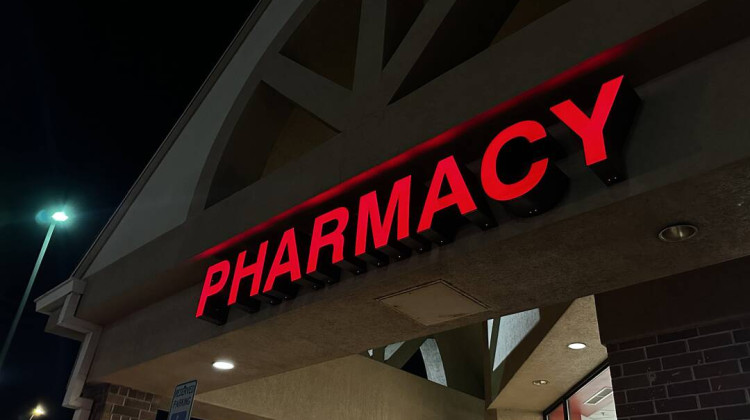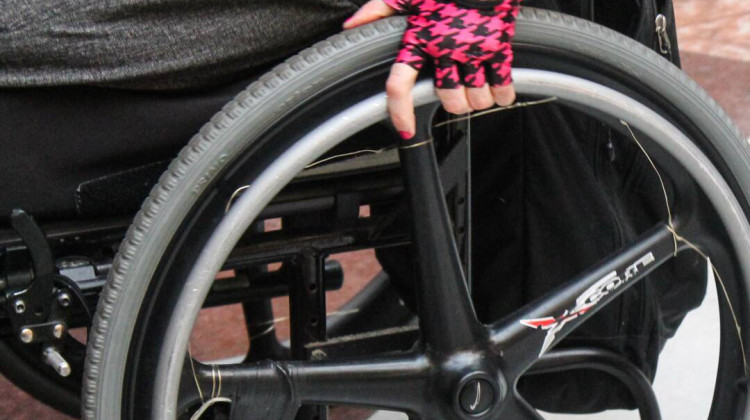
Indiana Gov. Eric Holcomb speaks with reporters during the Indiana Technology and Innovation Association conference in Fishers, Ind., on Friday, Oct. 8, 2021. Holcomb said he had not yet decided whether to appeal a court decision against his lawsuit challenging the expanded power state legislators gave themselves to intervene during public health emergencies.
AP Photo/Tom DaviesINDIANAPOLIS (AP) — Indiana’s pace of COVID-19 vaccination shots has fallen to its lowest level since the shots became available last winter.
The state health department’s tracking shows Indiana giving about 6,000 shots a day through last week — about half the rate from early September. The state continues to lag behind the national vaccination rate, and Indiana’s pandemic death toll has topped 16,000 people.
Indiana peaked averaging more than 50,000 shots a day in April as the COVID-19 vaccines became widely available. That declined until early summer when more people began getting the jabs at the same time that health officials blamed the more contagious delta variant for a steep jump in the state’s COVID-19 infections, hospitalizations and deaths.
Dr. Richard Feldman, who was state health commissioner under Democratic Gov. Frank O’Bannon, said he was concerned that the falling vaccination pace will leave too few people immunized, allowing COVID-19 to “smolder and smolder and smolder” through the population.
“I think a lot of people have just moved on, they’re tired of it,” Feldman said Tuesday. “I just don’t understand that reasoning.”
Indiana has consistently trailed the national vaccination rates, ranking 14th lowest in the country with 49% of all residents fully vaccinated, according to the Centers for Disease Control and Prevention. The national rate stands at 56.4%.
Indiana hospitals were treating 1,729 COVID-19 patients as of Monday, according to the state health department. That is down about one-third from the latest surge’s peak four weeks ago but about 450% higher than before the surge started in July.
The state’s seven-day rolling average of deaths is about 30 a day, compared to about 40 a day in mid- and late-September and July’s low of fewer than five. Indiana passed the 16,000 mark in pandemic deaths in recent days, with the health department having recorded 16,109 deaths involving confirmed or presumed COVID-19 infections.
Republican Gov. Eric Holcomb hasn’t participated in a state COVID-19 news briefing since late March soon after he announced he would let the statewide mask mandate expire even as he has continued renewing the state’s public health emergency that now extends until Oct. 31.
Holcomb said he continues to talk about the pandemic every day and urging vaccinations as the best way to prevent hospitalizations and deaths.
“We’ll continue to lean into making sure that those resources are readily accessible, easy to access, and we try to be as persuasive as we can,” Holcomb said Friday. “If people don’t want to take the vaccine, then that’s their right.”
Feldman said he was worried that another surge was possible as the weather turns colder and people are spending more time indoors at a time when face mask usage has noticeably declined.
It will be up to businesses to push greater vaccinations as political opposition among conservatives prevents state officials from mandating any safeguards “or really press individuals to try to do the right thing,” Feldman said.
“I mean they say it once in a while, but it’s not a priority,” Feldman said. “And it’s not politically feasible right now in this climate.”
 DONATE
DONATE







 View More Articles
View More Articles


 Support WFYI. We can't do it without you.
Support WFYI. We can't do it without you.